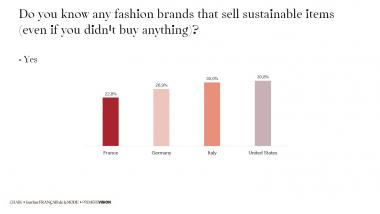The fashion market: A move towards responsible consumption?
A study by the IFM - Première Vision chair
The fashion market in Europe and the United States: A move towards responsible consumption?
Eco-responsible consumption is no longer a fashion trend, but a major groundswell now impacting the entire sector, from material sourcing to the consumer and the textile and manufacturing industries.
This is one of the major findings of a recent study by the Institut Français de la Mode as part of the IFM - Première Vision Chair that surveyed 5,000 consumers, who constitute a representative sample for France, Germany, Italy and the United States.
"For the first time, this study helps us better understand consumers' perceptions of the responsible fashion market and its products, and decipher their buying motivations and obstacles," said Gilles Lasbordes, Managing Director of Première Vision.
A real enthusiasm
Eco-responsible fashion products are essential. Nearly 50% of European consumers report having purchased an eco-friendly fashion item in 2019 along with 46% of French consumers (including recycled, organic, made in France, and second-hand textiles).
"These figures show consumers are committed to a level well above the estimate we would have expected, and indicate a real maturity in terms of their expectations. However, fashion is lagging behind other sectors such as food: the proportion of consumers who have purchased organic food products is over 60% in all countries. By the same token, especially in France and Italy, organic beauty products are meeting with real success, with 57% of French consumers purchasing them in 2019," notes Gilles Lasbordes.
In France, the 46% of consumers who bought eco-responsible fashion products are projected to spend an average of 370 Euros on fashion products (clothing and shoes) in 2019. Nationally, the average budget for eco-responsible fashion purchases per French consumer is 170 Euros, which is about 25% of the average budget for clothing and shoes in France.
What's driving this enthusiasm? In France and Italy, preserving and protecting the environment are the principal motivations behind such purchases. Consumers also pay special attention to the non-use of toxic chemicals. These concerns are well reflected in initiatives such as the Fashion Pact launched in the run-up to the G7 in Biarritz last summer.
Natural fibres and prices
The study also shows that, when searching for more responsible fashion products, consumers are very strongly guided by the choice of materials. They prefer natural fibres and recycled raw materials when they can, in particular when they are informed of their presence. Preconceived ideas about which materials are considered most harmful to the environment concern polyester, acrylic, polyamide and leather, respectively.
One of the other findings of this survey concerns barriers to consuming more responsible fashions, with one of the main barriers being a lack of information. The consumers feel they have a genuine lack of knowledge about eco-responsibility (its definition and criteria). Some 50.4% of French consumers admit to not knowing enough to select the right products.
Beyond a lack of education, another difficulty is access to these fashions, which consumers report not knowing where to find. This is a genuine obstacle for 39.8% of the French consumers canvassed. A lack of clarity of the offer - not much transparency on the part of brands, a multiplicity of certificates - and an under-representation of players - only 23% of French consumers reported knowing responsible fashion brands - is compounded, to a lesser extent, by the question of price, which is a barrier for 33% of French consumers.
On the other hand, style no longer represents an obstacle to the purchase of responsible products. Contrary to perceptions of only a few years ago, consumers today are aware that responsible fashion can be creative, desirable and respectful of the environment and people.
Lastly, consumers seeking to buy more responsible products are now faced with an offer that is still insufficiently developed in terms of their expectations. At the same time, second-hand purchases are increasing and feeding this trend: 56.1% of American women and 42.2% of French women purchased second-hand goods in 2019.
Made in…
For a majority of the French consumers surveyed, an eco-responsible fashion product must be manufactured in France (80%) or Europe (46%). This preference for national production is slightly lower in Italy (65%) and Germany (71%) but remains strong. "A product has to be manufactured as close as possible to the market where it is sold in order to reduce the negative impact of transport as much as possible," says a French consumer.
Also, among the criteria to be met for socially responsible production, consumers emphasise respect for the health and safety of employees, a criteria that ranks far ahead of issues related to wages and discrimination of people employed in the sector.
A guiding hand to the fashion ecosystem
"The fashion ecosystem is being shaken up by this environmental phenomenon, with consumption in a state of strain and a slight decline in the mid-range, for example. This study will be useful to steer the sector, guide the market, provide precise analytic keys for industry and brands wishing to expand their offer. And that is also our objective and the role of Première Vision," underlines Gilles Lasbordes.
The consumption of eco-responsible fashion represents a significant growth opportunity for brands and labels. The next few years will certainly see the introduction of a new system that is more respectful of the environment and the social conditions under which goods are produced.
The results of this study were also used to enrich the experience of the show's 2,055 exhibitors - spinners, weavers, tanners, textile designers, accessory manufacturers and fashion manufacturers - and its 56,000 visitors - international groups and fashion brands - at Première Vision Paris last year 17 to 19 September in Villepinte.
Sustainable Apparel
Chair Institut Français de la Mode - Première Vision


